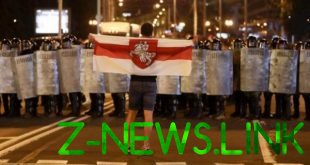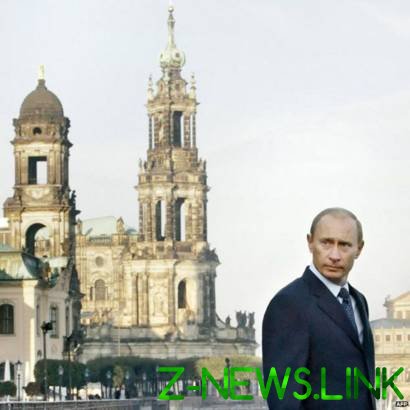
One albert Einstein gave the assistant exam questions for his students at Princeton. He looked at it and asked in surprise: “Not on whether these questions are answered in the last year?” Einstein replied in the affirmative, but added: “Since then changed the answers.”
In the West about Putin and Putin’s Russia, published more than a dozen books with evocative titles: “Putin’s kleptocracy”, a “State-mafia”, “Code of Putinism”. Is it possible to give new answers to old questions about the Russian government? Is it possible to tell the unknown about the Russian leader and his entourage? And what new can be added about the confrontation between Russia and the West?
New book “Putin’s People. How the KGB became Russia and went on the offensive in the West” (Putin’s People: How the KGB Took Back Russia and Then Turned on the West) is an attempt to give new answers to old questions.
The author, a former Moscow correspondent Financial Times Catherine Belton. She lived in Russia for 16 years. And work in FT in Moscow, says Belton in interview Bi-bi-si (the first in her life, when she doesn’t ask and answer the questions), helped her to get acquainted with the oligarchs, bureaucrats, security officials and Kremlin insiders.
- What did we learn about Putin from the movie “Sobchak Case”
- Putin’s words: what’s left in the speeches of the President and that disappeared for 20 years
The book is structured as a journalistic investigation: with a lot of links and sources, most of which, however, remain anonymous.
Belton says that undertook the study because other books written about Putin, in her opinion, a little superficial.
As examples of good books with investigations and multiple sources – she calls the work of David Hoffman’s “the Oligarchs” (2001) and “Sale of the century” (2000) Christi Freeland on Russia of the 1990s. But about Putin, according to the author, such studies no.
In her book intelligence officers, criminals, oligarchs, officials, and emigrants are constantly changing roles. Remain unchanged, the struggle for power and resources, the withdrawal of Russian capital to the West, including to fight the West. Not only Russian, but also Western heroes of the book appear unprincipled and greedy for money.
None of them evokes sympathy.
“Leftists” and technology?
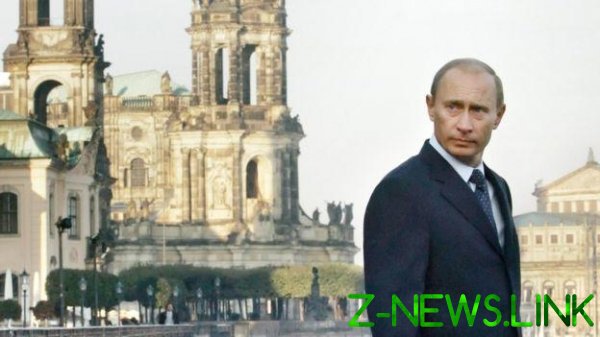 The holder иллюстрацииITAR-TASS / DMITRY ASTAKHOV
The holder иллюстрацииITAR-TASS / DMITRY ASTAKHOV
Belton shows how the changed and not changed, the KGB officer who became Russian President. One of the most interesting sections of the book devoted to the Dresden second half of the 80s, when it worked for Putin. The author will return the reader to Dresden throughout the narratives to explain the motives and methods of work of the Russian President, and at the same time his ideas about the world and its fears.
It is believed that the future Russian President in East Germany are not doing anything a little bit interesting – kind of office work, devoid of James bond glamour. And Dresden of that time was allegedly a city on the periphery of the KGB and East German Stasi.
However, Belton all looks quite different.
About that time, when Putin arrived in Dresden, West Germany became an important source of contraband technology and high-tech goods to the USSR and the GDR, says Belton. Shortly before Vladimir Vetrov, engaged in military-technical intelligence, gave the West detailed information about Soviet industrial espionage in the West. As a result, France expelled 47 Soviet spies, and the focus of the work of the Soviet secret police moved to Germany.
“Dresden was one of the points of theft of secret technology of the West that the Soviet Union could not be imported due to embargo. Dresden was a factory Robotron, where he cloned the IBM PC. With this plant involves a lot of transactions, they documented the German authorities,” says Belton.
The story of the East German Kombinat Robotron, where in the 1970s tried to copy IBM, is really quite well-studied in Germany, as well as working relationships with Soviet enterprises.
“Dresden was a meeting place for the members of the “Fraction of red Army” (RAF, the radical leftist terrorist group from Germany – approx. Bi-bi-si) with the KGB and the Stasi” – the author continues.
On account of RAF dozens of killings and hostage-taking. From declassified documents of the Stasi, it follows that the RAF enjoyed the financial and organizational support of intelligence services of the GDR that helped to move to East Germany, members of the organization.
He knew and played what role in these processes, the Soviet secret service, still not very clear. But in the book the Belton featured a former member of the RAF who told me about his meetings with Putin in Dresden. To check the statements made in the story are quite serious accusations against Putin impossible. Like to know the name of the person of the author. And not him alone.
Putin himself sparingly told that Dresden was engaged in “ordinary intelligence: recruitment source information, receiving information, processing it and sending to the center.”
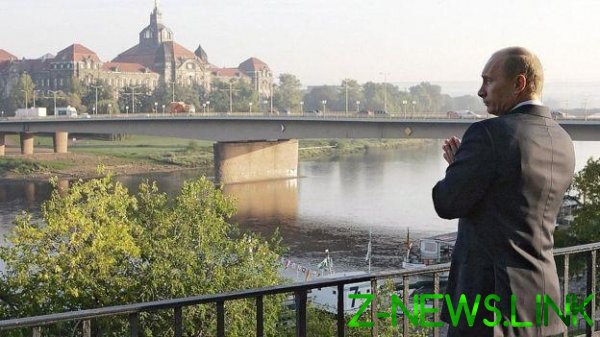 The holder иллюстрацииGETTY IMAGES
The holder иллюстрацииGETTY IMAGES
About Putin and his colleagues in Dresden author says Horst Jehmlich – the assistant to the head of the Dresden branch of the Stasi to coordinate the work with Soviet intelligence.
“I know that Putin and his team worked with the West, in the West they had contacts. But mostly they’ve been recruiting here [in the GDR] says Lemlich. They hunted for students before they left for the West.”
Thus, the book builds up a General picture of the environment that surrounded the future of the Russian President in Dresden and in which he somehow worked. Recruitment for information from the West, organization of work, aimed at the production of Western technology accompanying this shadow financial transactions, the proceeds of which went to support a variety of organizations (from the RAF to the legal Communist parties), the best of the KGB and the Stasi.
The last element is support and funding best KGB people – is Belton key chain, shaped the attitude and modus operandi of the intelligence personnel.
The true face
Based on the logic of the author, the coming to power of Putin (or other descendant of the KGB) appears to be inevitable.
Methods are also clear. Man is always difficult to give up their habits. If in the past you were engaged in smuggling, used the “black cash”, and it worked to achieve the objectives were then, then why now abandon offshore operations, and collaboration with, however unlikely, but effective people? But if your goal was to destabilize the West, why not use this tool, replacing the former ideological content into something new?
Even Putin’s actions in Ukraine in 2014, Belton connects with the Dresden and received in GDR psychological trauma.
“Rhetoric and government propaganda that accompanied the military actions of Russia (in Ukraine – approx. Bi-bi-si) seems to have been a reflection of the acute paranoia that has haunted Putin and his people since the orange revolution of 2004 and long before that: when Putin watched the collapse of the Soviet Empire, the mansion of the KGB over the Elbe in Dresden,” writes Belton, adding that in 2014, Putin’s regime was suddenly shown its true face.
The logic of actions of the Russian President and his entourage to the author of the book explains Vladimir Yakunin. A former employee of the First chief Directorate of the KGB, one of the founders of the cooperative “Lake” and eks-the head of Russian Railways says the British journalist about the perfidy of the CIA, is proud of the inclusion in the sanctions lists, but said that U.S. authorities are no longer aware of what is happening in Russia, if you think of Gennady Timchenko and Yuri Kovalchuk “bankers Putin.”
“The Russian President’s access to Finance across the country,” says Yakunin.
According to him, in the struggle with the West, Russia on the side of “humanistic traditionalist society, which opposes the absolute consumerism”, and this battle Moscow uses to again become a global player. And the cause of confrontation with the West is called the familiar set of grievances to the expansion of NATO to the East, in Romania and Poland, color revolutions.
To Corrupt The West
A sitcom, although not the funniest, you can see in that part of the book, Belton, where she writes about strategic mistakes of the West against Putin. In her opinion, at first the West did not understand the depth of the transformations that took place in Russia after Putin came to power.
Of course, it was hard not to notice how immigrants from the Soviet KGB, were part of Putin’s entourage, gained control over the strategic energy sector. But for a Western observer, says Belton, the rest of the business in Russia still looked independent.
The oligarchs of the Yeltsin era in the West many considered Pro-Western force in the Russian economy. But most importantly, the West expected that the growing middle class of Russia will require greater participation in the political life of the country. And special hopes were pinned on Russia’s integration into Western markets.
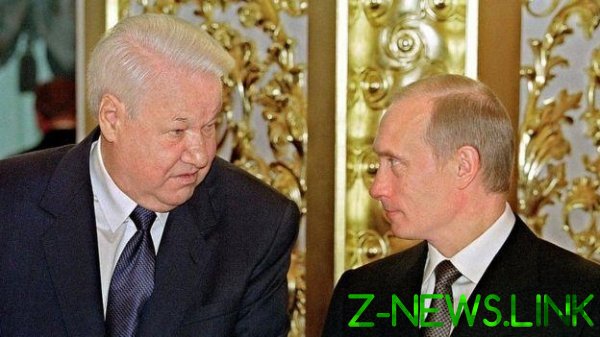 The holder иллюстрацииGETTY IMAGES
The holder иллюстрацииGETTY IMAGES
But integration has not changed Russia. On the contrary, Russia changed the West, the author writes. The West was hoping that the Russian oligarchs who came to London, becomes an independent driving force for change, but they became more and more dependent on the Kremlin. “They have become a vassal of Putin’s authoritarian kleptocratic state… and slowly began to corrupt the West,” says Belton.
Western politicians, businessmen and lawyers in the book are presented greedy conformists who care little for the origin of the money of their Russian customers and partners.
The former Western partners of “Yukos” have no moral qualms trying to bite off a piece of Empire of Khodorkovsky, when the latter goes to prison. Members of the British house of lords for half a million pounds a year included in the boards of Directors of Russian state corporations. Questionable means the Russians are buying up luxury real estate in Kensington and other Prime areas of the British capital.
“In London everyone and everything can be bought, – categorically declares in the book, the Russian oligarch, too. – The Russian came to London to corrupt the British political elite”.
One of the main mistakes of the West, according to Belton, the perception of Russian money exclusively as stolen, which were laundered for personal enrichment and legalization in the West. Understanding that this is “a black cash” for the strategic operations of the Russian state, to destabilize the West, it’s too late.
“But they have missed the point. The battle with the West has been brewing long before that. She was preparing even before the collapse of the Soviet Union, when a separate structure of the KGB was trying to keep its intelligence network to work and after the transition to a market economy, by helping Putin come to power,” writes Belton.
An unreliable witness
Fugitive oligarch Sergei Pugachev is one of those who told the author of a book about the regime of Vladimir Putin.
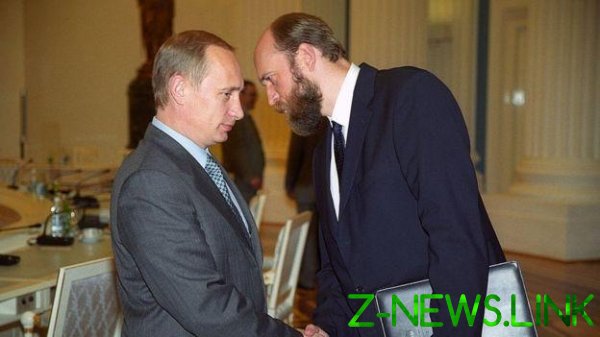 The holder иллюстрацииGETTY IMAGES
The holder иллюстрацииGETTY IMAGES
Pugachev called “Kremlin’s banker” in the time of Boris Yeltsin.
The billionaire claims that he brought the American political strategists who helped the re-election of Yeltsin in 1996. Then in winter, the rating of the Russian President was about 3%, and in summer, in the second round of the election, he received nearly 54%.
That election was memorable for the catchy slogans of Yeltsin’s campaign “vote or lose!”, “God forbid!”, “Buy food for the last time!”
However, it is still unknown who was the initiator of arrival of overseas guests and how significant was their role in those elections. One of the main stars of the Russian television of the 1990s, Yevgeny Kiselyov skeptical about their mission.
“There was a legend that the victory of Yeltsin provided some us strategists, advisors. Indeed, were American advisers who were brought Oleg Soskovets, they were sitting in the hotel “President hotel” on Yakimanka and did nothing. From time to time to them courtesy visits caused whether Yumashev, whether Dyachenko, listened to all the nonsense that they carried, because I didn’t understand anything about the state of Russian public opinion, nor on the political situation”, – said Kiselyov in interview Bi-bi-si.
Sergei Pugachev tells that he met with Putin in the early 90s and late 90s they have worked together and saw each other every day, when Putin became assistant to Pavel Borodin, the Executive Secretary of the President of Russia. Pugachev shamelessly calls Putin as his protégé and says that he chose Putin as Yeltsin’s successor because he thought that Putin can be controlled.
Pugachev claims that persuaded Yeltsin’s daughter Tatyana and her future husband Valentin Yumashev, the then head of the presidential administration, to appoint Putin Prime Minister and then to persuade Yeltsin to prematurely retire.
However, Tatyana Yumasheva called Pugachev words “complete nonsense”.
In Russia Pugacheva vs criminal case on charge in deliberate bankruptcy of Mezhprombank.
Moscow has made in the High court London freezing Pugachev’s assets in England. The court banned Pugachev to leave the territory of England and Wales. But he fled to France and received in Britain two years in prison in absentia for contempt of court.
A British judge, bear the sentence to Pugachev, found him an unreliable witness: “it is Obvious that his statements on many topics change depending on what he believes to be the most convenient version of events in this time.”
Can you trust the words of such a man? “He is not an angel, he hid the account from the English court – meets Belton. – Pugachev believed that all the rules of the English court – a trifle compared to what happened to his Empire.”
“But there are photographs where children Pugacheva communicate Putin, where he dines with Sechin, Patrushev, Ustinov and Viktor Ivanov – adds Belton, explaining why he considers it a fairly reliable source. – Have records after he fled to France, discovered by British detectives…. where he talks openly with senior people.”
A difficult choice and anonymous
A separate issue to the book is the abundance of anonymous sources telling including anecdotal stories (like the visit to “gangster Petersburg” of the 1990s-an unnamed foreign investor, which is the city hall took the negotiations to the country caricatured thug in a tracksuit and sneakers).
Many reviewers are impressed by the book, don’t pay attention to it. Not consider it a problem and Catherine Belton. “It is more important to understand the history than to force a man to go on the record,” she says, adding that for many people the question of anonymity was fundamental for reasons of personal security.
The terrorist attack on Dubrovka, as the operation of the Russian special services, which went wrong, she also writes the words of more than one such source.
“It was a difficult choice. I hadn’t planned to write about the Dubrovka and Beslan and about the blasts. I wanted to write about money, I wanted to write, as the Kremlin seized control of the economy,” says Belton, adding that this episode was for her the most shocking in the process of writing a book.
According to the author, she felt obliged to share doubts, after hearing the version of a “famous person” who knew details of the operation in the theatrical center on Dubrovka.
“We do not claim that this is 100% true, but when people from such a narrow circle willing to talk off the record, confidentially, our duty and responsibility to talk about it,” explains Belton his desire to tell the shocking story that cannot be verified, like some others in her book.
As a former journalist, Belton appealed for review to the authorities. Press Secretary of Vladimir Putin Dmitry Peskov called the story of the insider’s “complete nonsense”.
Book Belton has become a best-seller, enthusiastically accepts her criticism.
Times and the Financial Times called the best book about modern Russia, Putin and his entourage.
Guardian compares “Putin’s People” with the novels of John Le Carre, calling it to the last detail studied the anatomy of the Putin regime.
Spectator writes that the author has not only documented the ascent apparatchik of the KGB to the pinnacle of power, but followed his entourage carried out raider capture of the country and its finances.
“Belton paints a portrait of a leader with his disastrous ideas about the world of the late 1990s, where the mafia ideals and fantasies of great power – equal and interchangeable, where the rules for the few and survive heroes with acute paranoia,” writes a Spectator.
“I didn’t want people to think that the anti-Russian book. I write about a group of people who seized power, says Belton. And I describe their methods of working and thinking. It fragments the 1980s”.
Mikhail Zygar in the book “the Kremlin’s men” says that Putin’s story is about how a man accidentally became king: first successful reformer (king Lionheart), then a lover of the good life (the Great king), and then the king realized that he’s part of history (and became the Tsar Ivan the Terrible).
Catherine Belton, the Colonel of KGB in the end, and remained a Colonel of the KGB, even after becoming king.
© 2020, paradox. All rights reserved.





